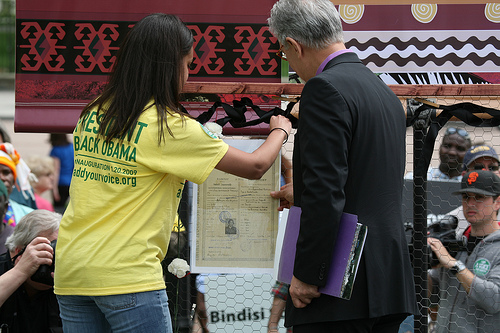Reposted from Politico:
By MICHAEL ABRAMOWITZ & MARK HANIS
Today marks the anniversary of the liberation of Auschwitz-Birkenau, the largest Nazi death camp. The United Nations designated this date International Holocaust Remembrance Day to honor the memory of those killed during the Holocaust and to rededicate ourselves to doing all we can to prevent such horrible crimes from happening again.
Given the bloody history of the past five decades — in Cambodia, Rwanda, the Balkans, Darfur and other places — a healthy degree of skepticism is warranted about politicians’ commitment to the lofty goal of “never again.” However, we believe that progress is discernible. Efforts by the United Nations and among member states to make genocide prevention a priority, coupled with a new focus by government officials and civil society on keeping political crises from metastasizing into massive violence against civilians, offer hope that a world without genocide is attainable.
Nearly 17 years ago, the United Nations looked the other way as genocide unfolded in Rwanda. So it was more than a little noteworthy last week when two senior U.N. officials, charged with monitoring for the threat of such grave crimes, bluntly warned about “the possibility of genocide, crimes against humanity, war crimes and ethnic cleansing” in the Ivory Coast.
The Security Council has reinforced the U.N. peacekeeping force in the country, and numerous governments in Africa and elsewhere are pressing Laurent Gbagbo to step down after the internationally recognized victory of opposition leader Alassane Ouattara in November’s election.
In Sudan, a referendum likely to result in partition of the country later this year proceeded relatively peacefully, following an intense diplomatic push by the United States and other countries. Only six months ago, there were serious questions about whether the referendum would occur on time, and many feared a return to the sweeping violence, even genocide, that has plagued Africa’s largest country since its independence in 1956.
Severe dangers remain in both the Ivory Coast and Sudan — particularly in the long-troubled Darfur region, where violence has surged in recent months. However, there is reason to hope that governments around the world are finally getting the message that investing to prevent mass atrocities is not only sound humanitarian policy but also far more cost effective — avoiding huge costs of handling refugees, reconstruction and other requirements that inevitably follow genocide. Genocidal states also are invariably failed states, which incubate terrorism, pandemic diseases and other scourges.
Just last year, the United Nations reaffirmed its commitment to a “Responsibility to Protect,” making clear that its members are willing to step in to protect civilians from genocide, ethnic cleansing and other atrocities when countries are unwilling or unable to do so. New U.N. offices on RtoP and Genocide Prevention are working to shine a light on situations where these crimes are occurring or likely to occur.
The Obama administration has appointed, for the first time, a White House director of war crimes and atrocities at the National Security Council and established an interagency prevention committee to address potential threats of genocide and mass atrocities.
Congress also has taken some tentative steps toward endorsing genocide prevention as a matter of policy. On the last day of its recent session, the Senate passed a resolution that recognizes the U.S. national interest in “helping to prevent and mitigate acts of genocide and other mass atrocities against civilians and supporting and encouraging efforts to develop a whole government approach to prevent and mitigate such acts.”
As important as these steps taken by Washington is the continued growth of a vibrant and vocal constituency of citizens and nongovernmental organizations committed to the abolition of genocide and other mass atrocities. Governments everywhere are on notice that they risk public opprobrium and embarrassment if they fail to respond effectively to the kind of killing that took place in Rwanda or Darfur.
Despite these gains, considerable work remains. Much of this agenda was laid out in the December 2008 report by the Genocide Prevention Task Force, co-chaired by Madeleine Albright and William Cohen. The report recommends an array of measures aimed at strengthening government capacity to prevent mass atrocities.
Some of the recommendations have been adopted, but many have not — including a strong presidential statement of policy on preventing genocide, the creation of an international atrocities prevention network and greater funding for crisis prevention in countries at risk.
This must be accompanied by continued efforts to build a permanent anti-genocide constituency around the world that will hold all governments accountable for turning “never again” into a reality. This task requires organization and massive public education about the moral, financial and national security costs of genocide.
Achieving this goal would be a worthy accomplishment to celebrate on another International Holocaust Remembrance Day.
Michael Abramowitz is director of the Committee on Conscience, the genocide prevention initiative of the U.S. Holocaust Memorial Museum. Mark Hanis is co-founder and president of the newly merged Genocide Intervention Network / Save Darfur Coalition.











